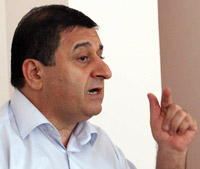Yesterday the former deputy prosecutor-general Gagik Jhangiryan answered the questions of the journalists at the court building of Kentron and Nork-Marash.
According to the A1+, he as a lawyer evaluated whether the March 1 case is a political persecution, political vendetta or serious law-enforcement. “I have never thought off the word vendetta but political persecution came into mind and I used it several times. Vendetta is more characteristic to the Italians. I thought that this phenomenon is over in Armenia but when it came to me and as Hammarberg formulated it as a political vendetta I realized that it’s not over in Armenia yet. We also have the institute of blood to blood. In many cases when crimes are not revealed and investigated properly the friends and relatives of the victims murders the assassin. At present as laws are not enforced people will have to resolve their problems on their own,” said Gagik Jhangiryan. As a specialist of criminal law he thinks in the framework of the March 1 case there is no one, who tried to usurp the power illegally. According to him each crime consists of 4 elements – object, object side, subject, subject side. According to Jhangiryan in the accusations brought up by Article 300 of the Criminal Code none of the 4 elements is included. “There is not a single trait; therefore there is no crime either. The reason why there is no crime is that Article 300 clearly is anticipated for the ones, who try to violently or illegally usurp the state power. But we don’t have anything like that,” said Jhangiryan. Later he brought up details that on March 1-2 the people have not seized the building of the city council, which according to the last revised Constitution on 2005 is not a state institution any more but a local government. “It means that they have not seized even the building of the self-governing body. Even if they seized community centers or village centers it wouldn’t still be considered usurpation of power or the state. Only the government building and the parliament and other state buildings are state bodies. These people only raised the voice of their discontent,” he explained. And what were the people doing near the French Embassy? “People were illegally beaten and pushed away from the square. They used special means, such as electroshock, gas, batons, etc. People were followed in the whole city. Does our legislation have such a method of punishment or investigation? There is no such method. If they were coming to the square for the search they should have visited the site with at least 100 investigators; they should have brought numerous experts and forensic doctors, etc,” mentioned the former deputy prosecutor-general. By the way Jhangiryan thinks that the government cannot punish any of the policemen, who hot at the people because if so it will become known that the government gave the order of fire. “I have been a military prosecutor for ten years. You can call any colonel and ask them to present the scheme of the whole square. They should tell you what type of tropps were deployed in each street – Koryun, Leo, etc. If you ask them, Mr. Commander of the regiment, who gave you the order to release tear-causing gas he will say that the order came from the commander of the general troops. And then if you continue this chain you will see that the original order came from the president. That’s all. What’s obvious will become known for everyone. Although even now everyone knows what actually happened,” he said. Jhangiryan also spoke about the regulation of the NKR conflict. “In the event of compromises we should make sure that our compatriots of Artsakh will live in safety and security wherever they wish. I have a great fear that in the event of returning the liberated territories in 6 days we will have the whole population of Karabakh moving here. If the Armenian troops don’t protect the border no other international peacekeepers will ever care to do so. We should clearly and consciously realize this fact,” said Jhangiryan.

